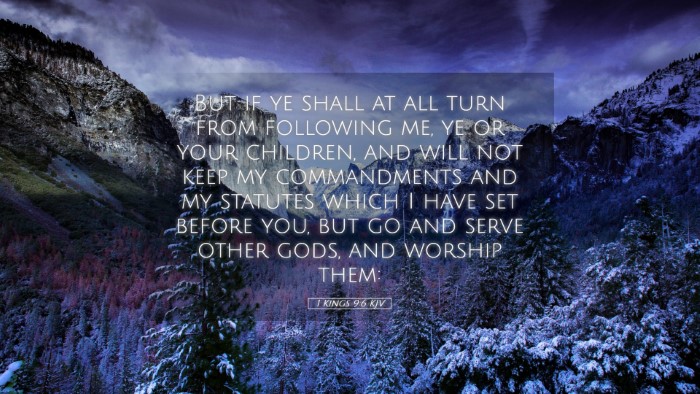Commentary on 1 Kings 9:6
Verse: "But if ye shall at all turn from following me, ye or your children, and will not keep my commandments and my statutes which I have set before you, but go and serve other gods, and worship them;" (1 Kings 9:6)
Introduction
This pivotal verse in 1 Kings serves as a reminder of God’s covenant with Israel and the conditional nature of His promises. In this commentary, we have synthesized insights from public domain sources to provide a deep understanding of the theological and practical implications of the verse.
Contextual Background
1 Kings 9 recounts God’s appearance to Solomon after the construction of the temple, affirming His covenant promises while also warning about the consequences of disobedience. This chapter highlights the significance of fidelity to God's commandments as a central theme in the relationship between God and His people.
Historical Setting
This verse reflects the conditions set forth in God’s covenant. Solomon has established Israel’s golden age, marked by wealth and monumental achievements. However, the potential for future rebellion against God looms large, setting the stage for Israel's eventual decline.
Theological Insights
This verse serves as both a warning and a promise, delineating the consequences of turning away from God.
1. Conditional Covenant
Matthew Henry notes that God’s blessings are conditional. If Israel strays, the consequences will be grave. The emphasis on "ye or your children" highlights the generational impact of disobedience.
2. The Nature of God’s Commandments
Albert Barnes emphasizes that God's commandments are rooted in His love for His people. Keeping the commandments is not merely about obedience; it echoes a relationship characterized by trust and devotion.
3. Idolatry as a Grave Offense
Adam Clarke discusses the serious nature of idolatry mentioned in the latter part of the verse. Serving other gods is portrayed as a profound betrayal, not just to God, but to the covenant relationship established with Israel.
Applications for Today
These insights are not only historical but serve as poignant reminders for contemporary believers.
- Faithfulness in Leadership: Leaders within the church must uphold the commandments as a testament to their faithfulness to God. The choices made by leaders can have lasting effects on future generations.
- Guarding Against Idolatry: In modern contexts, idolatry may not always manifest as the worship of statues. It can involve the prioritization of materialism, popularity, and personal ambitions over a devotion to God.
- Covenantal Responsibility: Understanding that faith transcends personal belief—it influences community behavior and future generations. The teachings of the Bible should be passed down as sacred and necessary for spiritual health.
Reflections on God's Character
This verse reveals key attributes of God's character:
- Justice: God maintains a standard of justice that ensures disobedience has consequences. This illustrates His holiness.
- Patience: Despite the stern warning, God's willingness to forgive and restore following repentance highlights His grace and mercy.
- Loyalty: God's commitment to His covenant demonstrates steadfast love and faithfulness to His promises.
Conclusion
1 Kings 9:6 serves as a pivotal warning about the consequences of straying from the path God has ordained for His people. Through the insights of historical commentaries, we see a complex interplay of love, faithfulness, consequences, and hope. As leaders, scholars, and believers reflect on this verse, may it inspire a renewed commitment to uphold God's commandments and protect the integrity of their covenant relationship with Him.


